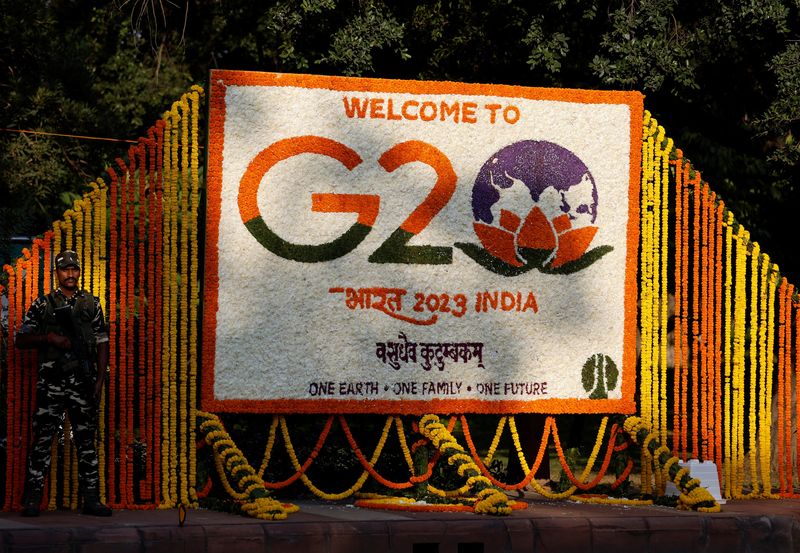By Nandita Bose
NEW DELHI (Reuters) -U.S. President Joe Biden and Indian Prime Minister Narendra Modi spoke for nearly an hour on Friday about joint plans on technology, infrastructure and the importance of a healthy democracy, shortly after Biden arrived in New Delhi for a G20 summit over the weekend.
The two leaders pledged to cooperate on issues from democratic values and human rights to semiconductor supply chains and quantum computing, according to a joint statement.
"We're frankly thrilled to be here. It's great to see the Indians so appreciative that we've come," Kurt Campbell, the senior U.S. official for Indo-Pacific policy, told reporters after the discussions.
The leaders were working on a "major breakthrough" related to infrastructure and communications that would link India with the Middle East and Europe, that could be announced on Saturday, Campbell said.
The U.S., India, and Gulf countries have been talking about a sweeping new rail and ports network to link the regions, a counterpoint to China's 'Belt and Road' global infrastructure plans.
India and the U.S. will also cooperate in 2024 on the International Space Station, 5G and 6G technology and microchips, said Eileen Laubacher, U.S. National Security Council senior director for South Asia.
As Biden and Modi met at the Prime Minister's residence, the U.S. press corps was sequestered in a van, out of eyesight of the two leaders - an unusual situation for the reporters and photographers who follow the U.S. President at home and around the world to witness and record his public appearances.
The prime minister's office released a handful of official photographs of the meeting, showing the two leaders seated side by side and chatting amiably.
Biden and Modi last met in person in June when the Indian leader was the guest of a White House state visit. The two men were expected to advance a number of agreements reached in June, including a deal to allow General Electric (NYSE:GE) to produce jet engines in India to power Indian military aircraft.
U.S. Treasury Secretary Janet Yellen joined Friday's meeting, as did White House national security adviser Jake Sullivan, the White House said in a statement. Indian attendees included external affairs minister Subrahmanyam Jaishankar and security adviser Ajit Doval.
Though the countries are not formal treaty-bound allies and India has long relished its independence, Washington wants Delhi to be a strategic counterweight to China.
Armed with cash for the World Bank and promises of sustained U.S. engagement, Biden hopes to persuade fast-growing economies in Africa, Latin America and Asia that there is an alternative to China's Belt and Road project, which has funneled billions of dollars to developing countries but left many deeply in debt.
After the G20, Biden is to visit Vietnam before returning to the United States later on Monday.
CRITICISM OF PRESS FREEDOMS
Questions about press access on the India trip have been persistent, after the official White House schedule did not show that the usual pool of reporters would be allowed in for the start of the Modi-Biden meeting.
Biden spoke to Modi about the importance of a healthy democracy, Campbell told reporters. "He doesn't do this in such a way that suggests that one country is lecturing to another but rather that we all face shared challenges," he said.
Campbell said he would not be drawn into a discussion about press access, saying Biden preferred to address such topics privately.
The press pool from the United States, made up of representatives of major news organizations, accompanies the president on foreign and domestic trips and normally has some access to major events. News organizations reimburse the U.S. government completely for the cost of the trips, and it is extremely rare for them to be barred completely.
The First Amendment of the U.S. Constitution protects freedom of speech and the press in the United States, while freedom and expression of speech is protected in Article 19 of the Indian Constitution.
Modi, of the Hindu nationalist Bharatiya Janata Party, has faced criticism about shrinking press freedom in India since he took office. The government says India has a vibrant free press.

Modi, who rarely meets the press or answers journalist's questions in India, was asked by an American reporter at a joint news conference with Biden at the White House in June about his human rights record.
His allies attacked the reporter afterward, in a targeted online harassment campaign that the White House later called "unacceptable" and "antithetical to the very principles of democracy."